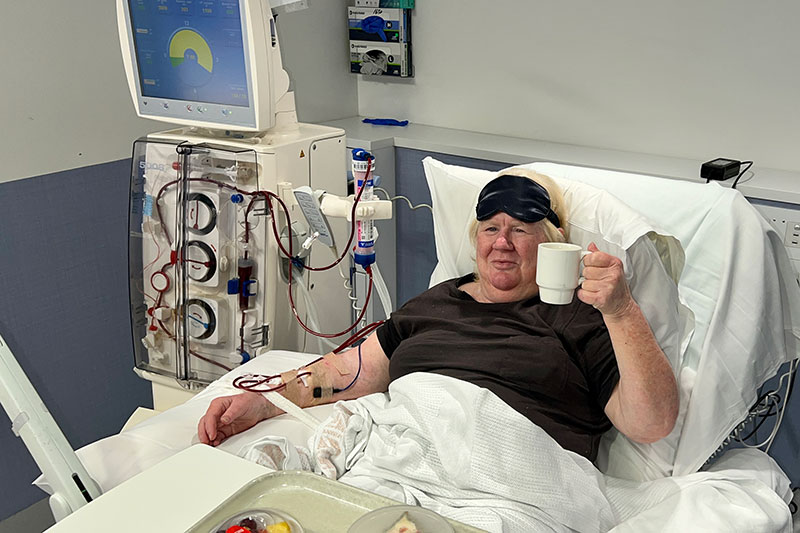Key facts:
- Nocturnal dialysis started at Epworth in 2017
- Treatment overnight, instead of four hours during the day
- Studies show less impact on patients
With night time dialysis, the machine runs at half speed, so I find it’s not as much pressure on my body and I don’t come out of it exhausted like I did with day dialysis.
While most of us are sleeping, a small group of people gathers at Epworth Eastern up to three nights each week to have lifesaving treatment.
The Epworth Eastern renal dialysis unit started nocturnal dialysis in October 2017, providing a night option for patients undergoing dialysis while on the kidney transplant list.
Nephrologist Dr Vatsa Dave said patients on dialysis have kidney disease that has progressed to a point where the kidneys no longer support life.
“That’s where dialysis comes in; it is essentially a form of life support treatment,” Dr Dave said.
“It helps you stay alive and maintain your quality of life.”
While day time dialysis takes four to five hours, night time dialysis can run over eight hours.
Dr Dave says night time dialysis gives back patients time during the day, with research pointing to multiple benefits.
“There’s lots of studies that show the longer dialysis hours, which we can do overnight, are better for patients. It provides better clearing of the toxins and poisons that accumulate in the body when you have kidney failure and it is less stressful for the other organs like the heart, brain and lungs, than to have a shorter, intensive dialysis during the day,” Dr Dave explained
“When we take the same dialysis treatment, same machines, same set up, but we spread it out over eight hours, it’s gentler on your body, and patients tend to have less long term complications from the treatment.”
Renal dialysis Nurse Unit Manager Amelia Flowers said for many patients, daytime treatment impacts their lives too much.
“Many of our patients are aged in their 40s, 50s and 60s and are on the transplant list,” Ms Flowers said.
“They find daytime dialysis is disruptive for work or study, so they come in at night.
Undertaking dialysis while you are sleeping can take a little getting used to.
“The patients are sleeping with the noise of the machine, the lights and the alarms. We give them earplugs and some patients use noise cancelling headphones to help them sleep,” Ms Flowers said.
Shelly Mcintosh, 61, became part of the ‘night time club’ late last year.
“I used to go to bed at 8.30pm anyway, so all I am doing is getting a taxi over to Epworth Eastern to sleep instead,” Ms Mcintosh said.
“With night time dialysis, the machine runs at half speed, so I find it’s not as much pressure on my body and I don’t come out of it exhausted like I did with day dialysis.
“The other people that I am with are lots of fun. You get your cup of coffee and sandwiches, watch what you want on TV then you lay back and go to sleep, and they wake you at five o’clock in the morning.”
Ms Mcintosh is going through tests in the hope she is suitable for a kidney transplant. Others from night time dialysis have received donor organs recently.
“Occasionally when one of the overnighters goes missing you think ok, they’ve had a transplant. There have been three who have had transplants since I started in December."




